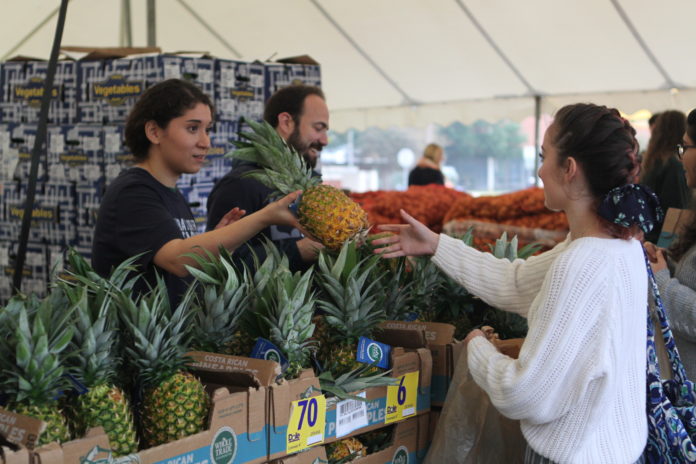
By Lizzie Thomas | Staff Writer
Baylor Free Farmers’ Market offered 33,000 pounds of fresh fruits and vegetables to all students Thursday, serving around 600.
This event occurs once a semester. The other free food events Baylor hosts is the mobile food pantry, which happens about once a month. Both are intended to take the stigma and shame away from students who lack fresh, nutritious food by making it a campus-wide event, according to Sarah Madsen, the graduate coordinator for Student Success Initiatives. More information about these services can be found here.
“[Food insecurity] is taking place at Baylor, which is partly surprising because at a collectively affluent university, students have money to pay for food or housing or things like that,” said Madsen.
Madsen started running Baylor’s food pantry in August, which serves 135 students per week on average. According to Madsen, the initiators of the awareness of food insecurity – Cara Cliburn Allen, a doctoral candidate in the Higher Education Studies and Dr. Nathan Allman Associate Professor of Higher Education Studies – learned that food insecurity impacts students across the country, and not just where it would be expected — but at all campuses.
“They were interested in if this phenomenon of food insecurity was happening at Baylor,” Madsen said. “Just briefly, food insecurity is the inability for students to have access to nutrition for variety of reasons or [lack of access] to a regular food source. This can be skipping meals or just eating ramen or not a lot of variety in nutrients in their diet.”
Madsen said some indicators of a food insecure student might be swiping into dining halls with friends because they don’t have a meal plan or frequenting events with free pizza.
A lot of times, researchers expect to find food insecure students at community colleges, Madsen said. Because tuition is expensive and because of the cost of living, however, they are finding them at all universities.
“Food insecurity can effect any type of student,” Madsen said. “There are certain demographics such as income levels and international students, those types of groups where food insecurity may affect more-so, but just because of the kind of current college financial advisement, it can really affect anyone.”
Half of the food insecure students are food insecure for the first time in college, Madsen said. Growing up, most had access to food, but the sudden burden of expenses and lack of resources push them toward food insecurity, Madsen said.
“I think, especially as a Christian school, at Baylor we very much care about loving our neighbors, and so I think with the food insecurity efforts, we can really demonstrate that love for each other, especially when students are struggling with this kind of hidden problem,” Madsen said.
According to Michelle Cohenour, director of Student Success Initiatives, the purpose of the umbrella of programs is to help students be the best they can be by meeting the needs they have, whether those needs are very academic or very basic. Student Success Initiatives support a variety of student populations like veterans, first generation students and transfer students.
“A new area for us in the last year and a half has been the food insecurity,” Cohenour said. “Our team is one — and this is what I love about our mission — we are here to support students and help them be successful and walk alongside their journey. One thing that we’ve noticed is food insecurity being prevalent on our campus, as it is on many campuses.”
Student Success Initiatives was able to pivot quickly to meet that need, Cohenour said. When students come in to get tutoring and academic support, sometimes they stop by to get food support, too.
“It makes sense with Maslow’s Hierarchy: if those basic needs aren’t being met , they can’t focus in class and bring their best to the classroom,” Cohenour said. “Some people might think it’s an outlier service, but for us, it’s central to what we do.”




